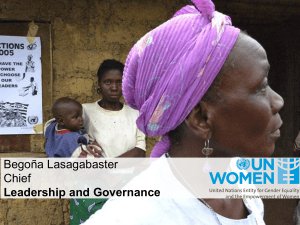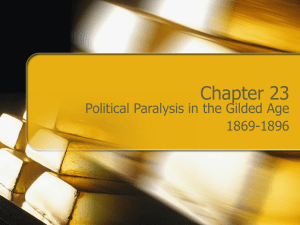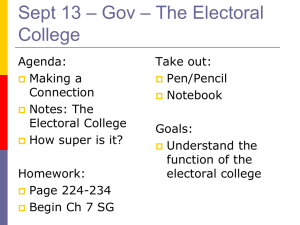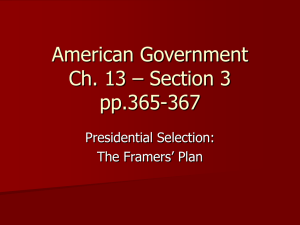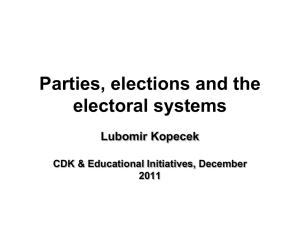A.B. Mahmod - Mustapha Akanbi Foundation
advertisement
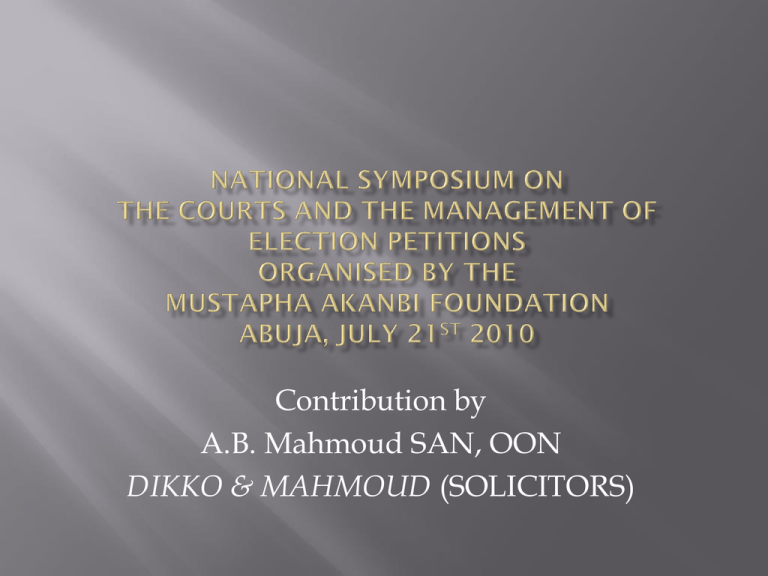
Contribution by A.B. Mahmoud SAN, OON DIKKO & MAHMOUD (SOLICITORS) True or False: ‘Justice Delayed is Justice Denied’ has no relevance in Election Petitions. Delays defeats justice: It is easy to accept this maxim in the fields of Criminal Justice and Civil Justice But what about in the field of Electoral Justice? What is electoral justice? The process by why the legal system comes to the aid of the electoral process to ensure that the will of the electorate in choosing its representatives to run affairs of state is protected. Is Electoral Justice different? Actors: The Candidates The Electorate The wider Public The Issues: Elective Offices are time bound; officers generally elected for specified term Public Funds (Tax payers) Democracy/Governance/Public Policy: smooth transition, minimum disruption in government business What is behind the delays in trial of election petitions? The Role of Political Parties; The Role of the Election Management Body EMB; (INEC, SIECS) The Role of the Courts; The Structural and Institutional Arrangements Procedural Political Parties play a central role in our democracy Constitution grants and protects the rights for the civil association that creates them; The constitution grants them the legal right, and perhaps until the new amendments, the monopoly to participate, present candidates at elections. They are fundamental and central to our system of representative democracy Perhaps the most relevant vehicle for the expression of the will of the electorate. Many of the conflicts within the electoral system are generated by the political parties: Manipulation of the system for election of party leaders and candidates for elections; Role of godfathers Powers of incumbency whether of Governors or President etc : use of state resources The role of political parties is illustrated: Ararume v. INEC (2007) 9 NWLR pt 1038 pg 127 Ameachi v. INEC 2008 5NWLR pt 1080; 227 Some the conflicts spill into the Election Petitions under what we term “Pre-election Disputes” These have made Election Adjudication more protracted: Ameachi’s case; The cases of Sokoto and Kebbi; The question then is what should be done to streamline the role of the parties: They reciprocate the constitutional and legal privileges granted them so that they enhance our system of representative democracy by themselves becoming more democratic, transparent and accountable to their members? More Structured engagement with the EMB that provides greater interaction, consultation and input into decisions pertaining to elections and preparation for elections. Greater reporting and disclosure in the areas of funding and election finance It is generally perceived that the EMB in Nigeria have not in recent past acted credibly or in a transparent manner. There are serious allegations of corruption, lack of transparency, manipulation by Politicians and functionaries at the highest levels INEC became a tool in the hands of the Presidency in trying to exclude certain candidates, notable was the case of Atiku Abubakar EMBs it is widely believed deliver a predetermined outcome. Naturally these conduct generated considerable amount of legal disputes creating unnecessary burden on the judiciary both before and after the elections. How do we ensure that the necessary safeguards are in place to enhance the values, norms and principles that govern the activities and functions of the EMBs? That they are truly independent, autonomous and impartial? That their actions are responsible, transparent, and carried out with the highest degree of professionalism The safeguards must be both institutional and normative Institutional: the legal provisions: Legal and Financial Autonomy Security of Tenure The Uwais Panel Recommendations The new constitutional amendment and the new electoral act making its way through the National Assembly geared towards making improvements in the legal and institutional arrangements. Strengthening INEC’s autonomy making it a non-party to election disputes What about the normative issues: the values of integrity, transparent management and administrative best practices within EMBs? The recent appointment of Prof. A.M. Jega to Chair the INEC was widely acclaimed and seeing as a signal that this Administration is serious on its promise to improve our electoral system. Offers a good opportunity to revamp the system and make it more credible. Some suggestions: Its relationship with political parties: regular, sustained and transparent; The new draft electoral act proposes more powers to INEC to monitor the internal organisation of political parties: finances, conventions, congresses and party primaries; The relationship should not just be of policing but of sustained engagement and collaboration Its relationship with CSO and other stakeholders Continuous engagement throughout the Electoral cycle: prevoting phase, the voting-period and the post-voting period. Voter education Credible Voter registration Use of ICT to enhance transparency and public confidence: Register of Voters published on the internet? As a means of Enhancing confidence and building other critical national infrastructure and Electoral system needs in the long run to develop synergies with other national sub-systems: linking civic registration with voter registration Continuous civic/voter registration Transportation of election materials and national postal service The objective is make routine many of the key elements of the election process so that the nation can save its resources and process over time becomes less controversial and generates less disputes. A credible, strong and transparent electoral process will lessen the burden on the courts and minimize the use of the courts to attain electoral justice This is the main focus of this symposium: The main thesis is that mature, responsible political parties and Credible, professional and Independent EMBs will deliver credible elections and reduce considerably the use of the courts to settle election disputes. Still however, inevitably there will be election disputes; How do we ensure that these are speedily, effectively and credibly resolved? Institutional reforms: Continued improvements in the institutional /structural arrangements: The Uwais panel has recommended some changes and I believe some of these have been reflected in the new electoral act under consideration Strengthening the tribunals and making them more functional: reduced membership (5 to 3 with quorum at 2) Governorship petitions to be commenced at the Court of Appeal with appeals to the Supreme Court Is the adhoc national tribunal system really necessary? Moving Judges outside their stations, disrupting their family lives with inadequate resources not conducive to their functions. Constituting adhoc tribunals has turned out to be enormously disruptive of normal judicial duties at the State High Courts. Should the states judiciaries not be entrusted with the responsibilities of settling disputes with possibilities of appeals on clearly defined areas? Procedural safeguards: Time limits for election petitions? Previous jurisprudence (Unongo v. Aku 1983 14 NSCC 563 ) suggest that the legislature could not legislate to direct judicial functions and therefore any time limits in statutes within which a case should be tried offends the doctrine of separation of powers. Uwais panel recommends constitutional amendment to restore time limits. This is clearly the way to go: Timely disposal of election disputes is crucial to any democracy. It is almost universally accepted now that election disputes must be decided within pre- determined timelines In Africa many jurisdictions impose time limits ranging between 5 days to 30 days. Procedural safeguards Improvement in rules of procedure: the Practice Directions; front loading; filing of written addresses and appeals procedures: Harmonisation of Election Jurisprudence: Conflicting Decisions from various Courts, trial and appellate: Need for Certainty It is important as a prelude to any general elections that the Judiciary in collaboration with EBM, the Bar Association etc conduct rigorous training seminars involving judges and lawyers at which issues around election disputes procedural issues, practice directions etc are thoroughly discussed Post-elections and after most of the disputes have gone through the system interactive and collaborative involving all stakeholders appraisal ought to be carried out Any new ideas? What about ADR?: Conciliation Mediation Arbitration ADR has been in an extremely useful tool in the settlement of disputes: commercial disputes, labour disputes, other civil disputes, why not electoral disputes? Many advovates of ADR have suggested its adaptation to Political party disputes See for instance Applying the ADRs To Political Party Disputes a paper presented at the INEC Workshop on Resolving Political Disputes in a Democratic Setting – the Place of ADRs for political parties etc, Yar’ Adua Centre, Abuja, Dec 15, 2008 by Prof Andrew I. Chukwuemerie* ) The advantages of ADR are well known Can it be adopted to Election Disputes? South African Electoral Justice Experience shows extensive use of ADR Comparative Experience….Training, Sharing African and other experiences especially from other emerging democracies as well as strong democracies…Ghana, India, South Africa etc Normative safeguards: Integrity issues Competence, appointment procedures Training Disciplinary oversight The Role of the Bar Electoral Justice is an essential part of democracy. The speedy disposal of election related disputes within pre-determined time lines is now universally accepted as an essential element of electoral justice Inability to achieve this will be a grave failure on the part of the Nigerian Legal system and is capable of undermining our democracy. The Legal Profession must rise to the challenge to ensure all necessary safeguards: institutional and procedural an in place to guarantee that future election disputes are resolved speedily, justly and efficiently.
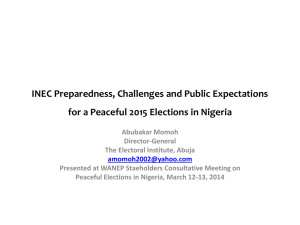
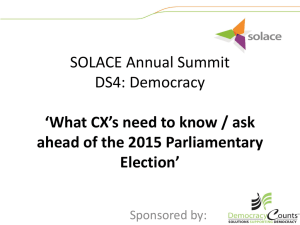
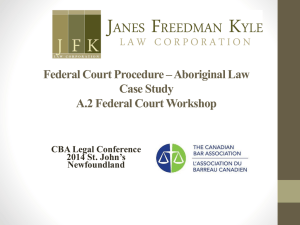

![PLEWA joint panel presentation [MS PowerPoint Document, 132.7 KB]](http://s2.studylib.net/store/data/005388913_1-9a663c909a47d520a5a627c8de595641-300x300.png)
